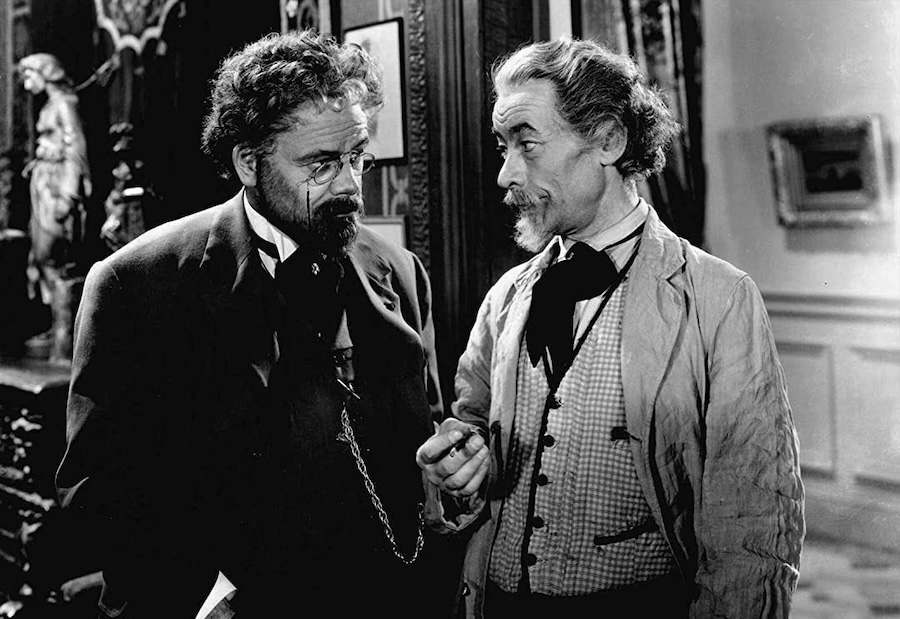
HE TAUGHT THE WORLD THAT… TRUTH CANNOT BE HIDDEN! POWER CANNOT BE ABUSED! LOVE CANNOT BE DENIED!

In the 1930s, biographical films won Best Picture two years in a row. In The Great Ziegfeld, William Powell played the legendary theatrical impresario Florenz Ziegfeld, and in The Life of Emile Zola Paul Muni portrayed the French author Émile Zola. Both movies were great hits in their day, widely admired by critics. Now, they are largely forgotten as screen biographies are very common, sometimes lucrative, many of them generating great attention from actors who see a chance to challenge themselves and perhaps win an Oscar in the process. Today, it’s hard to see why The Life of Emile Zola received so much attention, but it’s still a film worth seeing – and debating.
Two struggling artists
We first meet Zola in 1862, when he’s sharing an apartment with his friend Paul Cézanne (Vladimir Sokoloff) in Paris. In other words, two struggling artists, yet to be discovered. Zola’s fiancée Alexandrine (Gloria Holden) finds him a job as a clerk in a bookshop and that’s where he draws attention for the first time, writing and publishing a novel called ”The Confessions of Claude”, which renders him an official warning from the authorities. From then on, Zola keeps irritating those in power, highlighting injustices and corruption.
Years later, Émile Zola is a wealthy but still controversial author, rejected by Cézanne who believes he has abandoned his ideals. Then comes the day when Zola is drawn into a spy scandal that will go down in history as the infamous Dreyfus affair…
Choosing not to mention anti-Semitism
We all know what happened. Dreyfus was convicted of treason and sent to Devil’s Island and when evidence emerged that he was innocent, high-ranking military officials buried it, even adding false charges to make sure Dreyfus remained incarcerated. Anti-Semitism played an important part and Émile Zola helped expose the scandal with his famous ”J’Accuse…!” letter, published in 1898. Nowadays, no one would think of addressing the Dreyfus affair without talking about the role of anti-Semitism, a classic example… but in 1937 things were different. When the film premiered there was no mention of anti-Semitism or even the word ”Jew”. Subsequent studies have suggested that Hollywood studios were overly cautious when it came to politics, hesitant to put lucrative business in Germany at risk. As a result, The Life of Emile Zola now comes across as less effective and strangely silent on what everybody knows is at the core of the Dreyfus affair.
It was Joseph Schildkraut who picked up the Oscar as Dreyfus, but Paul Muni tends to overshadow him.
Still, much here is worth a look. The director reunited with Paul Muni after his Oscar-winning turn in The Story of Louis Pasteur (1936) and it’s hard not to compare the two films, as Muni would once again play a French icon who stood up to the establishment in the late 1800s. Muni was known for disappearing into wildly different roles and in this case he gets to play Zola over many years, from his impudent youth to his comfortable 50s, when he sees a chance to be relevant again. It was Schildkraut who picked up the Oscar as Dreyfus, but Muni tends to overshadow him.
The film rushes through Zola’s early years, establishing what makes the author tick, and then focuses on the immense rot within France’s military and its consequences; much of the second half is a trial drama, conventional but still engaging. All in all, a solid film… but what’s missing might have made it great.
The Life of Emile Zola 1937-U.S. 116 min. B/W. Directed by William Dieterle. Screenplay: Norman Reilly Raine, Heinz Herald, Geza Herczeg. Book: Matthew Josephson (”Zola and His Time”). Cast: Paul Muni (Émile Zola), Gloria Holden (Alexandrine Zola), Gale Sondergaard (Lucie Dreyfus), Joseph Schildkraut (Alfred Dreyfus), Donald Crisp, Erin O’Brien-Moore, Louis Calhern, Harry Davenport.
Oscars: Best Picture, Supporting Actor (Schildkraut), Screenplay.
